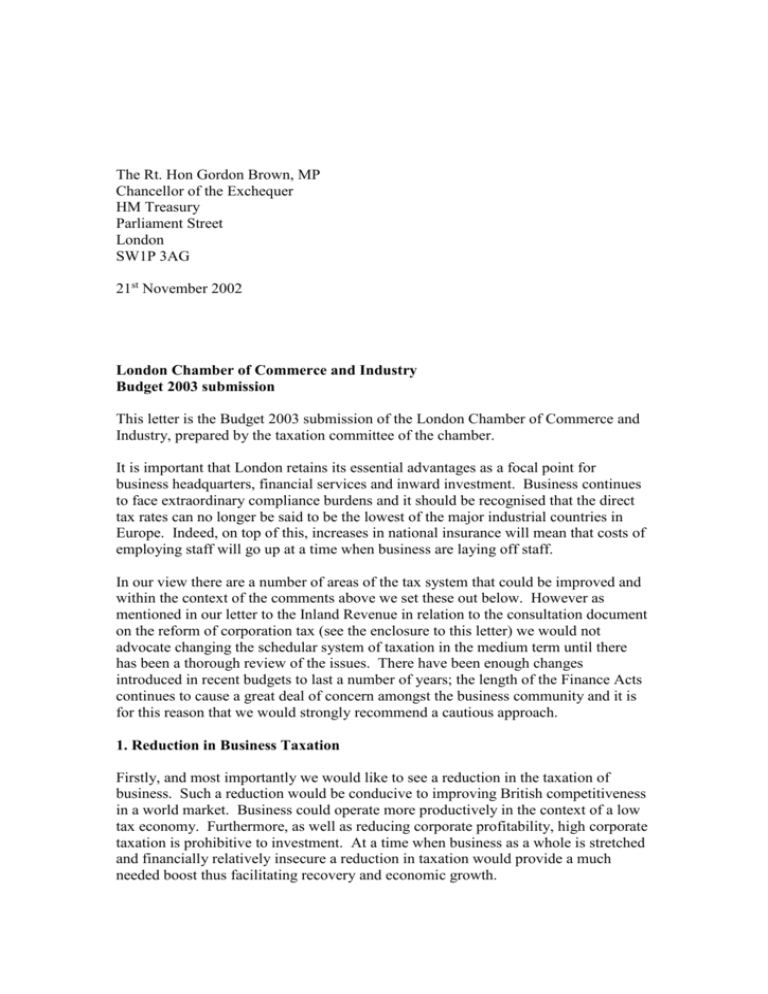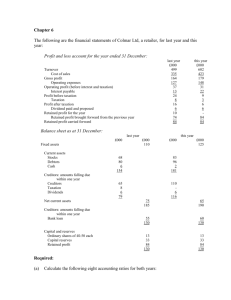Rt Hon Gordon Brown MP - London Chamber of Commerce and
advertisement

The Rt. Hon Gordon Brown, MP Chancellor of the Exchequer HM Treasury Parliament Street London SW1P 3AG 21st November 2002 London Chamber of Commerce and Industry Budget 2003 submission This letter is the Budget 2003 submission of the London Chamber of Commerce and Industry, prepared by the taxation committee of the chamber. It is important that London retains its essential advantages as a focal point for business headquarters, financial services and inward investment. Business continues to face extraordinary compliance burdens and it should be recognised that the direct tax rates can no longer be said to be the lowest of the major industrial countries in Europe. Indeed, on top of this, increases in national insurance will mean that costs of employing staff will go up at a time when business are laying off staff. In our view there are a number of areas of the tax system that could be improved and within the context of the comments above we set these out below. However as mentioned in our letter to the Inland Revenue in relation to the consultation document on the reform of corporation tax (see the enclosure to this letter) we would not advocate changing the schedular system of taxation in the medium term until there has been a thorough review of the issues. There have been enough changes introduced in recent budgets to last a number of years; the length of the Finance Acts continues to cause a great deal of concern amongst the business community and it is for this reason that we would strongly recommend a cautious approach. 1. Reduction in Business Taxation Firstly, and most importantly we would like to see a reduction in the taxation of business. Such a reduction would be conducive to improving British competitiveness in a world market. Business could operate more productively in the context of a low tax economy. Furthermore, as well as reducing corporate profitability, high corporate taxation is prohibitive to investment. At a time when business as a whole is stretched and financially relatively insecure a reduction in taxation would provide a much needed boost thus facilitating recovery and economic growth. Lower corporate taxation has the following benefits for business: Business would have more money available for investment. At present there is a crisis in business investment with business investment falling by 10.8% in the year to Q2 2002, according to ONS figures. This failure to invest in our future will have long-term negative effects on the economy if it is not rectified soon. Lower corporate taxation would make businesses more competitive against foreign competitors. This is particularly important for manufacturers who account for a large proportion of UK exports – an industry that has been in recession since the start of 2001. Profit margins are higher meaning more businesses can stay in business and consequently employ people and produce goods and services. This is particularly important in the current economic climate because of the economic downturn. Businesses would have more money to invest in company pension schemes. This is critical at the moment with the decline in the Stock Market destroying the value of company pension schemes. Many companies have deficits on their company pension schemes which are final salary based and many are being forced to move over to money purchase schemes (refer to point 7 below). The rise in National Insurance contributions will take money out of the private sector and this needs to be rectified by a reduction in corporate taxation. Lower corporate taxation helps attract inward investment to the UK. The UK’s share of inward investment fell sharply in the first half of the year. In the six months to June 2002 the UK won 16% of Europe’s inward investment projects down from 22% in the same period of 2001, according to Ernst & Young. 2. Reducing compliance 2.1 The payroll system The payroll system is complex and has become more so over recent years. National insurance was extended to include most benefits in kind and the rates of tax will increase. The operation of tax credits through the payroll system imposes further burdens. We urge there to be a reappraisal of the system so that business is able to operate under less stringent circumstances. 2.2 Treasury Consent The Treasury consent provisions and its potential criminal sanctions are outdated. It is understood that the Revenue want to retain S.765 Income and Corporation Taxes Act to obtain information on certain transactions. This information could be provided as a part of the self-assessment process. 2.3 Cross-border interest The ability to pay cross border royalties and deduct tax at the appropriate tax treaty rate without formal clearance, as set out in S.96 Finance Act 2002, should be extended to the payment of interest. 3. Holding company issues 3.1 Tax exemption on overseas dividends Although the new on-shore pooling provisions have benefits they are highly complex. Also the interaction of the controlled foreign company legislation and double tax relief provisions are not straightforward. We are in favour of the introduction of an exemption system, which places no restrictions on the deductibility of financing and other costs of acquiring underlying subsidiaries. Such a system would meet recent European Court of Justice decisions and would be simpler to operate. 3.2 Cross-border EU group relief The extension of loss relief to losses incurred by EU subsidiaries, being offset against a UK parent company’s profits, should naturally follow on from the recent AMID case. We would therefore request that the Finance Act 2003 contain provisions to introduce such relief. 3.3 Management expenses and “tax nothings” As mentioned in our response to the Inland Revenue’s consultative document on the reform of corporation tax, it is reasonable for enterprises to obtain deductions for costs that are genuinely expended for the purpose of carrying on business. In addition to the “tax nothings” mentioned in our letter (namely costs on raising equity finance, costs of abortive capital expenditure, costs on leasehold acquisitions) we would draw attention to “management expenses” which are presently disqualified. In certain cases companies are unable to obtain deductions for such costs where the company is neither regarded as carrying on a trade nor undertaking investment activities. This is anomalous and should be rectified. 4. Business Activities: Trade and investment More generally the tax system should not make a distinction between investment and trading activities where it is clear there is an active business. Not only should this reduce the possibility of “tax nothings” as mentioned above, but we would also urge that this distinction be eliminated in both the taper relief and corporate substantial shareholding disposal provisions. It seems to us that companies carrying out genuine business activities should also be the subject of full benefits under these provisions. More specifically, in connection with the substantial shareholder provisions the exemption should also apply to earn-out receipts where the vendor does not retain ownership over the shares. 5. Enterprise Management Investment Scheme 5.1 Overseas companies with UK operations As pointed out in previous budget submissions, it is not possible for a foreign company which sets up a UK subsidiary to take advantage of the Enterprise Management Incentive Scheme. In our view the absence of this form of option arrangement to overseas companies deters inward investment. 5.2 Limitations of the scheme The scheme is hedged with extensive anti-avoidance provisions, which discourage firms from taking advantage of it. The Inland Revenue do not offer any model scheme rules or form of option agreement; this is unhelpful since a company can then be exposed to penalties if at a later stage the Revenue believe there to be defects in drafting. Further, the scheme is restricted to certain UK trading activities. In our view the scheme should be extended more generally to active business operations. 6. Stamp duty on share and property transactions London continues to be strongly challenged as a global leader in share dealings. Its position as a leading trading centre would be enhanced if stamp duty were no longer imposed on share dealings. This would be welcomed by London’s financial services sector at a time when the market is not buoyant and competition between trading centres is intense. More generally we view the trend of increases in stamp duty on property transactions as unwelcome and urge there to be no more increases in real terms for the foreseeable future. This comment equally applies to whatever form of taxation that will replace stamp duty. 7. Pension savings We note with alarm the CBI’s estimates of the effect of the abolition of the dividend tax credits previously refunded to pension scheme funds (which took effect in 1997). This has contributed to companies closing their final salary pension schemes. New tax incentives are required to encourage pension saving. For example, there could be a national insurance credit which rewards employers for contributing to their staff’s pensions. There are currently a number of pensions tax regimes covering occupational pension schemes, approved personal pension schemes and unapproved schemes. This needs to be reviewed, as well as modernising pension annuities to introduce more flexibility and money back guarantees. 8. Extension of tax depreciation As set out in our letter to the Inland Revenue in relation to the reform of corporation tax, we would welcome an extension of tax depreciation to assets not covered by capital allowances. In our view this does not mean that there should be a radical change to the schedular system of taxation or to the taxation of capital gains. 9. Summary In general terms we would welcome improvements to the existing system of taxation as set out above. In our view a wholesale change to the schedular system and capital gains regime is not necessary in the medium term. Indeed there are a whole host of issues that need to be addressed in relation to the more recent provisions (e.g. intangible assets and substantial shareholding disposals) before any wholesale changes are made to the basis of taxation. The latter should be reviewed as a longterm objective which requires more consideration and consultation. Piers Merchant Campaigns Director Enc.







